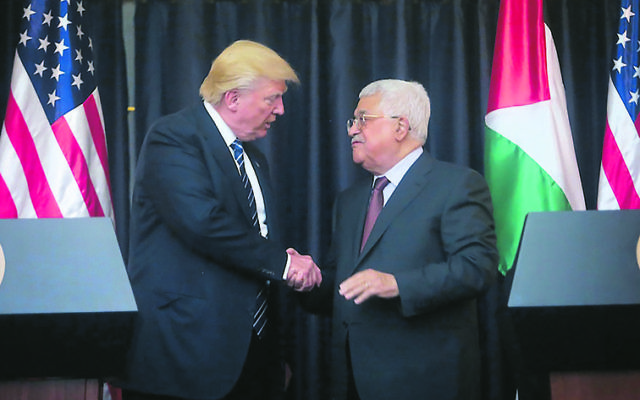Trump’s peace plan – what’s on the cards?
The Palestinians are coming under growing pressure from their friends to drop their antagonism to Washington's upcoming peace plan, according to Arabic media.

THE Palestinians are coming under growing pressure from their friends to drop their antagonism to Washington’s upcoming peace plan, according to Arabic media.
The Palestinian Authority has been furious with America since late 2017, when Donald Trump recognised Jerusalem as Israel’s capital, and said that Washington no longer has a role leading peace talks.
It has already dismissed the peace plan, which is expected to be released any day, as the “slap of the century”.
But several Arab countries are believed to be shocked by Ramallah’s brazen conduct, and a report just published in Egypt in the strongest indication yet that they are privately reprimanding the Palestinians.
The Al Shorouk newspaper quoted an Egyptian diplomat saying that Palestinians may come to “regret” not accepting what is on the table in the new US deal.
They should negotiate based on “whatever is available”, to avoid being “surprised” that the “monster” of settlements grows.
What hints have we received so far about the peace plan that Donald Trump has been touting for so many months and which, even before its release, is so reviled by Ramallah and attracting so much interest from some Arab leaders?
Unlike previous peace plans, there isn’t expected to be any proposal to divide Jerusalem.
Trump has said: “We took Jerusalem off the table, so we don’t have to talk about it anymore.”
If he sticks with this stance, the proposal is expected to leave all of Jerusalem (with the exception of Temple Mount) under Israeli control.
If the Americans are serious about Jerusalem being off the table, they are widely expected to propose that the Palestinian capital should be in Abu Dis, a Palestinian town on the outskirts of Jerusalem.
Palestinian officials hold the proposal in contempt, and Palestinian President Mahmoud Abbas rhetorically asked colleagues: “What would you want if Jerusalem were to be lost? Would you want to make a state with Abu Dis as its capital?”
Trump has made it clear that he expects a price from Israel for his recognition of Jerusalem as Israel’s capital.
“You won one point, and you’ll give up some points later, in the negotiation, if it ever takes place,” he said to Israeli Prime Minister Benjamin Netanyahu.
He was preparing Netanyahu and the Israeli public for the fact that the White House peace plan will expect some hard compromises from Israel – potentially on borders, settlements and a strengthening of Palestinian security forces.
The plan is expected to involve the evacuation of some settlements, but leave the large settlement blocs where the largest populations live intact, and make them part of sovereign Israel.
America is not expected to demand that Israel absorbs any significant number of Palestinian refugees, but is likely to ask for compensation for refugees.
The plan is expected to be heavy on details, as the Trump team believes that past peace documents have run into problems by presenting lots of guiding principles but not giving enough specifics on how to make progress.
According to a New York Times report this week, it will propose details that could be “pathways” to two states, but not actually insist on a two-state solution.
The idea appears to be that the administration wants to overcome the main hurdles to an Israeli-Palestinian agreement, but leave the two sides to decide how exactly to define that agreement.
The stakes are high for the Palestinians – in economic as well as political terms.
Trump is threatening to hit the PA in the pocket if it does not cooperate.
He believes that Israel wants peace and said that the Palestinians are “going to have to want to make peace too, or we’re going to have nothing to do with them any longer”.
During Trump’s first year in office, his Jewish son-in-law Jared Kushner was his star aide, but Kushner’s fortunes have changed, with his business conduct under scrutiny and the cloud of the Russia probe hanging over him.
Kushner’s security clearance has been downgraded.
An impressive peace plan could revive Kushner’s fortunes, while a plan that falls flat could be a further push in his fall from grace.
NATHAN JEFFAY

comments